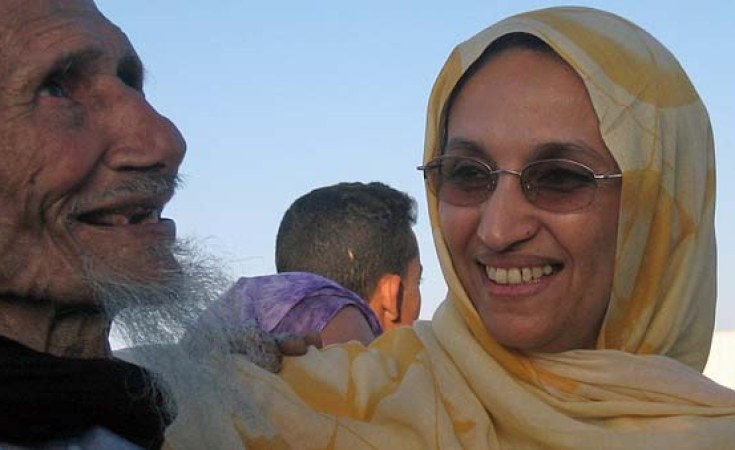Intense negotiations to save the life of Saharan hunger striker Aminatou Haidar and allow her to return to her home in Moroccan-controlled Western Sahara bore fruit Thursday night, when she was loaded by stretcher into a plane leaving the Canary Islands.
Intense international negotiations led to an agreement that would allow the Saharan activist to return home without either side abandoning its position. Haidar would not make the apology Morocco had demanded - saying that she had abandoned her citizenship – nor would Morocco need to admit wrong doing in deporting her when she attempted to return to Western Sahara after receiving the Civil Courage Prize in New York. Among the elements of the proposed agreement, not yet disclosed publicly, was the possibility of a royal pardon, which would allow Morocco to accept her return to the territory without insisting on an apology.
Haidar said she would resume eating only after landing in the Saharan capital. The 42-year-old mother of two, who has been called the Saharan Ghandi, launched her hunger strike November 16 at Lanzarote airport in the Canaries, after Morocco refused her return to Western Sahara. seized her passport and deported her.
Negotiators were racing against time. Haidar was taken to hospital in an ambulance early Thursday, with doctors warning that she might be suffering irreversible organ damage.
Spanish artists and film stars, including an Oscar-winning director, made a video promoting her cause that became popular on YouTube. British artists and intellectuals appealed to Prime Minister Gordon Brown to help. Amnesty International joined the urgent appeal to keep Haidar alive. The Robert F Kennedy Center for Jusatice and Human Rights sent staff to be with her in the Canaries, and conducted an interview with her, also widely circulated. A growing number of legislators in Europe and the United States have been issuing statements supporting Haidar.
The Defense Forum Foundation, a group advocating a strong defense policy, organized a protest at the Moroccan embassy in Washington DC at noon Thursday. Armed with a petition, a delegation was allowed into the embassy, where the ambassador met with them for around 40 minutes, promising to deliver their appeal to Morocco’s king. Demonstrators then marched to the Spanish embassy, where their petition was also accepted.
The unusual coalition of supporters – spanning both national and ideological boundaries – is understood to have spurred greater efforts to negotiate an end to the standoff between Haidar and Moroccan authorities. Media coverage has been increasing, with the prospect of mounting public awareness – and negative publicity for Morocco, whose tourist industry is economically important.
United Nations Secretary General Ban Ki-moon, who has been urging a solution that would save Haidar’s life, now ants to focus attention on the dispute that has deadlocked Morocco and Saharan independence activists. He has asked his envoy, Ambassador Christopher Ross, to re-intensify his efforts to forge a long-term agreement.


